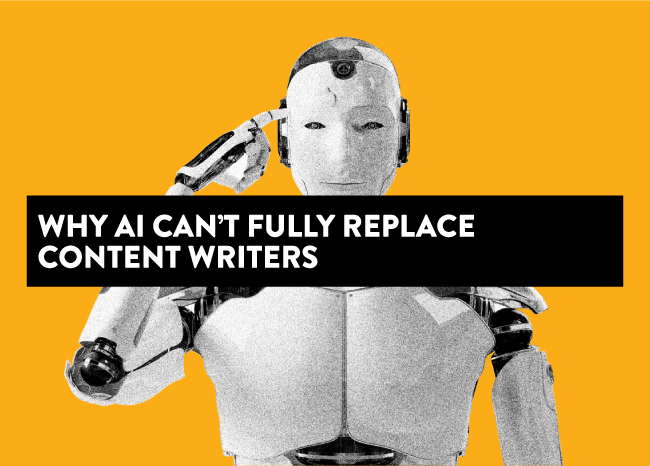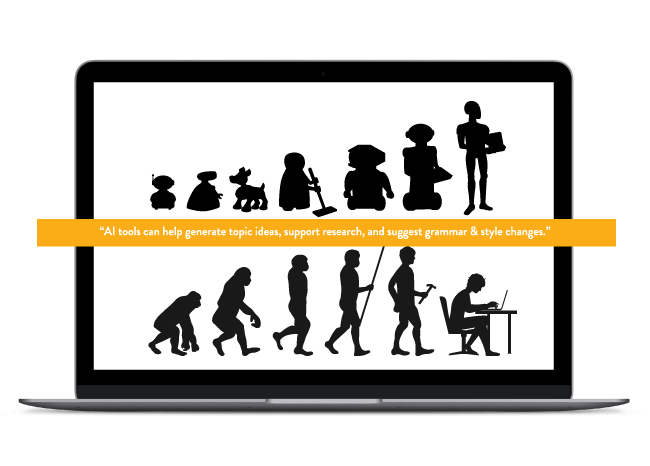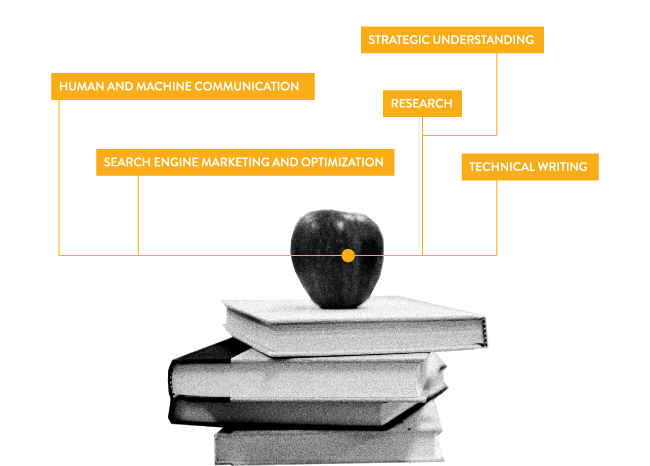
In today's digital era, how we write professionally has changed significantly, especially with the arrival of artificial intelligence (AI). The growth of AI writing tools and the internet has transformed how businesses communicate with their audiences, making writing a crucial skill for content marketing.
In 2023, 12% of businesses use AI for content creation to improve productivity, accuracy, and efficiency in the workplace. This article will address concerns about AI replacing content writers and highlight why human writers remain indispensable in content marketing.
Is AI a Threat to Content Writers?

The reality is that AI won't be replacing content writers anytime soon. Yes, AI can create content, but it can’t create valuable, unique content that Google loves to prioritize. AI tools can help humans create content faster and more accurately, but they cannot replace the creativity, experience, research, and storytelling that human writers bring to the table.
For example, these writing tools cannot:
- Connect thoughts or change subjects the way a human writer can.
- Vary the length of sentences to create engaging writing.
- Generate compelling narratives that connect with readers.
- Collaborate with clients about topics or additions to the article.
- Take constructive criticism.
- Understand business strategy or brand personas.
- Check facts and resources.
- Share human experience.
Content writers can also dive deeper into understanding target audiences and developing content strategies that align with business objectives. Rather than being a threat, AI is changing content writing by increasing efficiency and productivity.
How Does AI Work?
These writing tools still need humans to create content. They are programmed based on specific data points and input parameters. So, the quality of the output is based on the input. Professional content writers will always be needed to provide these elements. AI cannot replace them.
Aspiring and current content writers should embrace AI as a helpful tool rather than a threat. Instead of being replaced, writers can evolve and adapt their skills by utilizing the capabilities of AI. By leveraging AI tools and technologies, writers can focus more on their strengths, such as storytelling, critical thinking, and producing engaging content.
How AI Is Changing — Not Replacing — Content Writers

The digitization of the workplace, combined with the growth in AI technology, is altering the roles and responsibilities of content writers. Instead of making them obsolete, AI is transforming the industry and empowering writers with new opportunities.
In the past, content writers focused on many aspects of content creation: research, creation, project management, editing, and more. However, with AI automating certain parts of the writing process, professionals can create more content faster. For example, AI writing tools can:
- Generate blog ideas.
- Create outlines.
- Suggest language improvements.
- Show knowledge gaps.
- Gather research from the internet.
- Compile data.
- Translate writing for different language-speaking audiences.
- Adapt writing for a different audience.
AI tools can help generate topic ideas, support research, and suggest grammar and style changes. These tools serve as valuable assistants, allowing writers to streamline tasks and deliver high-quality content more efficiently.
Skills To Sharpen for the AI-enhanced Workplace

As AI becomes an integral part of the writing process, there are several skills that current professionals and aspiring writers should learn, including:
Human and Machine Communication
As stated before, AI-generated outputs are only as good as the inputs they receive. That’s why writers using AI writing tools must learn to input directions to get the best content available.
For instance, if you want to generate a social media campaign, it’s essential to tell the AI tool about the target audience, the product, the problem it helps solve, and the call to action. AI generative writing tools lack this inherent understanding, necessitating the collaboration between human content writers and AI to produce optimal outcomes.
Strong communication between human colleagues and clients can also help content writers write effectively. Content writers can apply helpful feedback to their writing to tailor content to a client’s needs. Understanding the goals and expectations of the client can help inform content writers on how to craft a unique and engaging story.
Strategic Understanding
In the digital landscape, understanding the strategic goals of businesses and how content fits into their overall marketing strategies is crucial. Writers who align their content with the main objectives of organizations have a competitive edge since they're able to create more meaningful and impactful content. Additionally, providing researched articles as a writer is valuable since you can share accurate and up-to-date information with your clients.
Learning in-demand skills like content marketing principles, consumer behavior, and market trends can also help create content that engages and drives action. These skills can be acquired through courses, webinars, industry-specific resources, and hands-on learning.
Research Is Still Important
Although AI writing tools can scour the internet in seconds, there have been instances where the AI will make up resources and statistics to fit the desired input. For example, our Business Development Manager asked Chat GPT for links to be used as sources in a blog post.
However, all the links that Chat GPT sent back were 404s. None of them existed — the AI writer made them up.
This practice can be harmful. If writers are not careful, they could unwillingly spread misinformation and may even be penalized by Google.
So, while content writers have been adept at research long before AI, it’s still an important skill to hone. The truth is that human writers cannot rely on AI writers to provide accurate sources because the technology just isn’t there yet.
Technical Writing
Technical writing is a specialized skill that can be highly valuable in an AI-enhanced workplace. This writing style simplifies complicated concepts and creates user-friendly documents.
As stated before, AI writers do not know about a specific product or service and how it relates to customers. Yes, it can generate a generic copy about how it works, but it won’t create industry- and business-specific articles.
Technical writing requires a deep understanding of products and services and hands-on experience. Writers must understand complex documentation and use that understanding to help AI writers generate copy.
By honing technical writing skills, content writers can help AI writers generate copy that centers around specific businesses and their offerings.
Search Engine Marketing and Optimization
As businesses increasingly rely on search engines, mastering search engine marketing (SEM) and search engine optimization (SEO) is vital. Professional writers who can incorporate SEO best practices into their work gain a competitive advantage by helping websites rank higher in search engine results.
So, familiarize yourself with keyword research, on-page optimization techniques, and content promotion strategies to guarantee your content ranks well in search engine results. Free online resources — such as YouTube, keyword research tools, and learning platforms — can also assist you in mastering these SEO skills from home.
In conclusion, while AI writing tools are revolutionizing the content creation process, they cannot fully replace the expertise and creativity of human writers. The collaborative efforts between humans and AI result in optimal outcomes as AI tools assist in generating ideas, improving grammar and style, and streamlining tasks.
By honing these skills, writers can adapt to the AI-enhanced workplace and leverage the benefits of technology to improve their craft and professional growth. This natural shift to AI-powered content will not reduce the demand for skilled content writers but instead open up new opportunities that never existed before.

